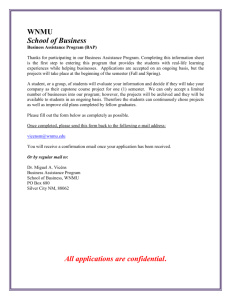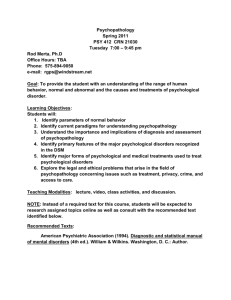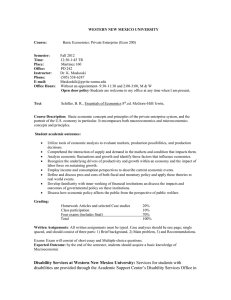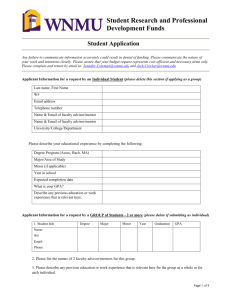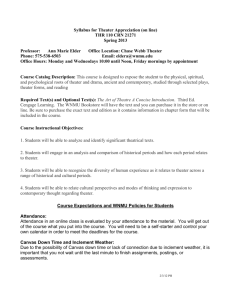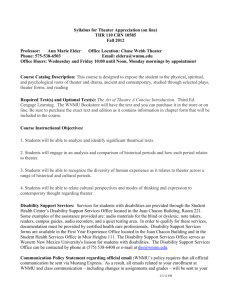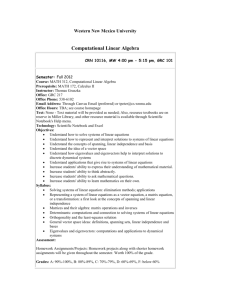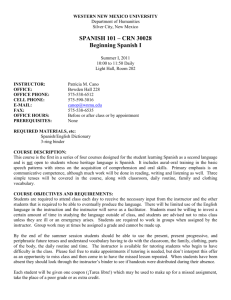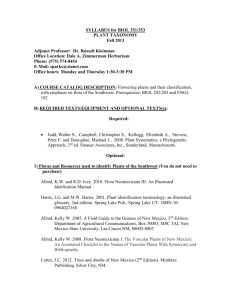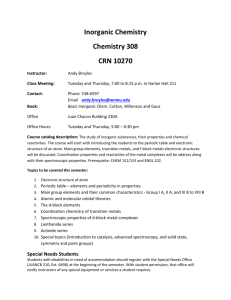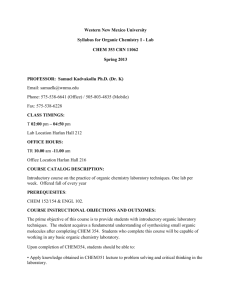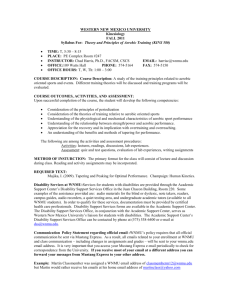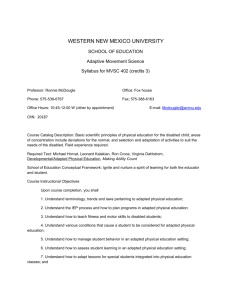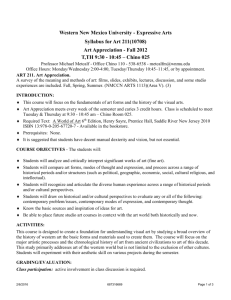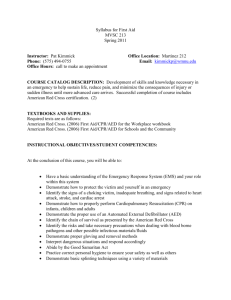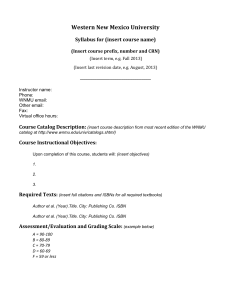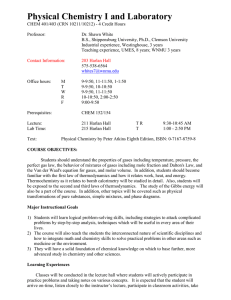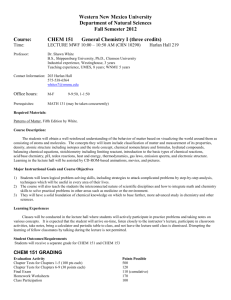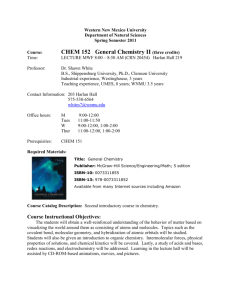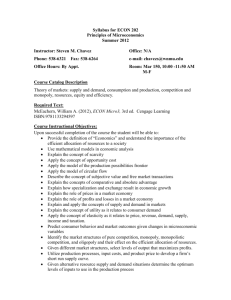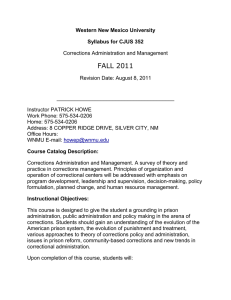THR 110 20961 - Western New Mexico University
advertisement
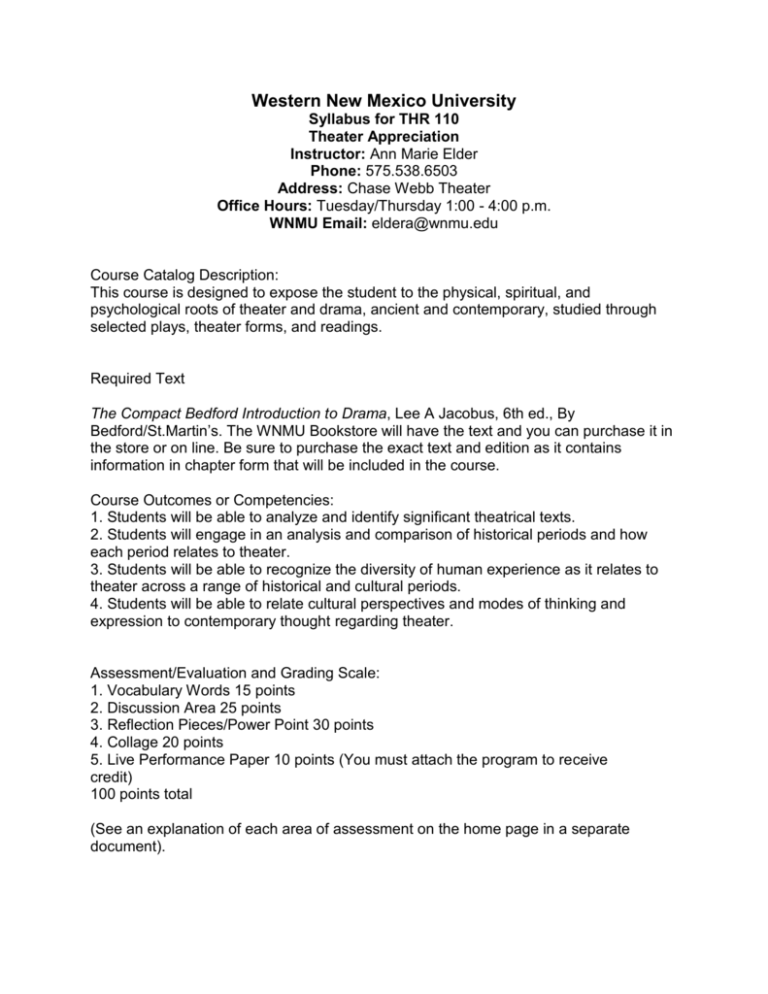
Western New Mexico University Syllabus for THR 110 Theater Appreciation Instructor: Ann Marie Elder Phone: 575.538.6503 Address: Chase Webb Theater Office Hours: Tuesday/Thursday 1:00 - 4:00 p.m. WNMU Email: eldera@wnmu.edu Course Catalog Description: This course is designed to expose the student to the physical, spiritual, and psychological roots of theater and drama, ancient and contemporary, studied through selected plays, theater forms, and readings. Required Text The Compact Bedford Introduction to Drama, Lee A Jacobus, 6th ed., By Bedford/St.Martin’s. The WNMU Bookstore will have the text and you can purchase it in the store or on line. Be sure to purchase the exact text and edition as it contains information in chapter form that will be included in the course. Course Outcomes or Competencies: 1. Students will be able to analyze and identify significant theatrical texts. 2. Students will engage in an analysis and comparison of historical periods and how each period relates to theater. 3. Students will be able to recognize the diversity of human experience as it relates to theater across a range of historical and cultural periods. 4. Students will be able to relate cultural perspectives and modes of thinking and expression to contemporary thought regarding theater. Assessment/Evaluation and Grading Scale: 1. Vocabulary Words 15 points 2. Discussion Area 25 points 3. Reflection Pieces/Power Point 30 points 4. Collage 20 points 5. Live Performance Paper 10 points (You must attach the program to receive credit) 100 points total (See an explanation of each area of assessment on the home page in a separate document). Requirements: You are required to read the following plays: Raisin in the Sun (in your text) Lysistrata (in your text) Othello (in your text) Play by Samuel Beckett (short script to be posted on the Website) Los Vendidos by Luis Valdez (short script to be posted on the Website) Angels in America (in your text) WNMU Policies for Students: Attendance: You will get out of the course what you put into the course. You will need to be a “self-starter”, and control your own calendar in order to meet the deadlines for the course. This is not a correspondence class. In other words you are expected to “show” up for class every week and participate in the assignments, discussions, and reflections. In order to receive the highest grade you are expected to respond to others and work collaboratively. It is up to you to provide proper documentation (i.e., doctor’s excuse) in order for a prolonged absence from discussion areas to be excused. It is up to you to make sure that all assignments are completed by the end of the semester and if you must miss class time because of personal illness, hospitalization, family illness, or emergency you are encouraged to check your student handbook regarding policy and procedure for missing class – these guidelines apply for on line classes. Copyright: The materials found in this course are only for the use of students enrolled in this course for purposes associated with this course and may not be retained by students in any electronic form or further disseminated or distributed to anyone not enrolled in this course. Informed Consent: Some individuals may choose to disclose personal information during class. Therefore, it is important that all classmates agree not to discuss or write about what others have discussed in class. Professionalism: Students are learning professional skills and are expected to engage in classroom discussions, complete reading assignments and turn in assignments in a timely fashion as befitting professional behavior. Scholarly Writing: Use clear college level writing with correct spelling and grammar for all assignments. All Reflection Pieces should be 12 font double spaced with a small heading for the week and your name. Post in the proper folder in the discussion area in the following formats: .doc, .docx, or .rtf. Any documents posted in other formats will not receive credit. If you need help in writing or learning how to cite sources, check with the WNMU Online Writing Center. Disability Services at WNMU: Services for students with disabilities are provided through the Academic Support Center’s Disability Services Office in the Juan Chacon Building, Room 220. Some examples of the assistance provided are: audio materials for the blind or dyslexic, note takers, readers, campus guides, audio recorders, a quiet testing area, and undergraduate academic tutors. In order to qualify for these services, documentation must be provided by qualified professionals on an annual basis. Disability Services forms are available in the Academic Support Center. The Disability Services Office, in conjunction with the Academic Support Center, serves as Western New Mexico University’s liaison for the students with disabilities. The Academic Support Center’s Disability Services Office can be contacted by phone at 575-538-6400 or email at matterr@wnmu.edu. Integrated Use of Technology: Because this is an online course, I am making the assumption that you are comfortable utilizing a computer, and navigating various software programs like Microsoft Word and Powerpoint and posting documents. If you have any questions about computer requirements see the “Student Resources” course in Blackboard. Need Help? 1. Post a question to the Discussion Board area folder called Q & A. There is no such thing as a dumb question. 2. Post a question as a Blackboard email to your instructor. 3. If the Blackboard system goes down or you have other technical questions, contact the WNMU Help Desk: helpdesk@wnmu.edu or (575) 574-4357. Academic Integrity Policy and Procedures: Each student shall observe standards of honesty and integrity in academic work completed at WNMU. Students may be penalized for violations of the Academic Integrity policy. Please refer to the current WNMU Catalog. Cite website’s and books when quoted, do not plagiarize from any other student. The reflection pieces in this course are half personal opinion and half based on your understanding of the material. DO NOT copy and paste material or opinion from any website. This is considered plagiarism and your work will not receive credit. Caveats: The schedule and procedures in this course are subject to change in the event of extenuating circumstances. CODE OF CIVILITY In order to promote a positive, professional atmosphere among students, faculty and staff, the following Code of Civility has been developed: Respect: Treat all students, faculty, staff and property with respect and in a courteous and professional manner. This includes all communications, whether verbal or written. Let your actions reflect pride in yourself, your university, and your profession. Kindness: A kind word and gentle voice go a long way. Refrain from using profanity, insulting slang remarks, or making disparaging comments. Consider another person’s feelings. Be nice. Truth: Exhibit honesty and integrity in your dealings with fellow students, faculty and staff members. Don’t lie, don’t cheat, and don’t steal. Responsibility: Take responsibility for your actions. This includes gracefully accepting the consequences of your behavior. Cooperation: Exhibit a cooperative manner when dealing with students, faculty and staff so we may all work towards our common goals and mission. Acceptance: Accept differences in others, as they accept differences in you. This includes diversity in opinions, beliefs and ideas and everything else that makes us unique individuals. Professionalism: Always conduct yourself in a manner that will bring pride to your profession, to the School of Education, to Western New Mexico University, and, most importantly, to yourself. Updated 12/15/2010
